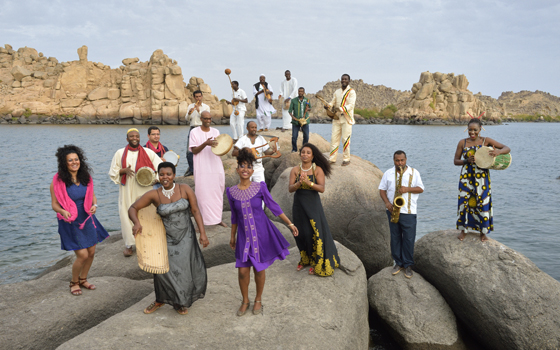
The Nile Project
Friday, April 10, 2015 at 8:00pm
Crowell Concert Hall
$25 general public; $22 senior citizens, Wesleyan faculty/staff/alumni, non-Wesleyan students; $6 Wesleyan students
Click here to view the full album on flickr.
"Euphoric"
—The New York Times
"For a short evening in time, nothing else existed but the beautiful sounds of perfectly collaborated music from the various countries along the Nile basin."
—Egypt Independent
Pre-concert talk at 7:15pm by Mina Girgis and Meklit Hadero.
The Connecticut premiere of The Nile Project features a dozen musicians performing collaboratively composed songs drawn from the diverse styles and instruments of the countries along the Nile Basin—including Burundi, Egypt, Ethiopia, Kenya, Rwanda, Sudan, and Uganda—intertwining these traditions into a unified sound that is “joyous and even raucous” (NPR Music).
Mohamed Abouzekry - oud
Alsarah (Sarah Mohamed Abunama Elgadi ’04) - vocals
Michael Bazibu - strings, percussion
Hany Bedeir - daff (hand drum), riq (tambourine)
Nader Elshaer - accordion, ney and kawala (end-blown flutes)
Dina El Wedidi - vocals
Meklit Hadero - vocals
Jorga Mesfin - saxophone
Kasiva Mutua - percussion, vocals
Sophie Nzayisenga - inanga (zither)
Steven Sogo - bass, umiduri
Selamnesh Zemene - vocals
The group’s vocalists sing in eleven different languages, connecting pointed melodies with rich modal traditions. Brooklyn-based singer/songwriter Alsarah (Sarah Mohamed Abunama Elgadi ’04) was born in Khartoum, the capital city of Sudan. Lyrical topics range from the deeply personal to party anthems, exploring themes of identity, regional solidarity, intercultural relationships both between and within their respective homelands, local music scenes, and living in the diaspora.
A powerful, polyrhythmic percussion section drives the collective, which reunites instruments of ancient common ancestries, and merges new ones. The plucked harp (lyre) and spike fiddle have formed the heart and soul of the region’s musical identity for millennia, and modern versions of both instruments are found in every country along the Nile Basin. Highlighting the unique timbres of these instruments, the plucked harp is represented by the Sudanese masankop, Ugandan adungu, and Egyptian simsimiyya and tamboura, while the spike fiddle manifests as the Ethiopian masenko and Ugandan endingidi. These instruments are joined by complementary sounds from their respective traditions, including the Ethiopian saxophone, Egyptian ney (end-blown flute), oud (lute), and violin, and the bass guitar.
At 4,200 miles long, the world’s longest river runs through the political boundaries of eleven countries and touches the lives of 437 million people, yielding an enormous range of songs and dances which express stories, emotions, and daily life. For millennia, the Nile has nourished lands of human, ecological, and cultural beauty; but over the past century, East Africa’s leaders have struggled to find ways to preserve and share this critical resource. Founded by Egyptian ethnomusicologist Mina Girgis and Ethiopian-American singer Meklit Hadero in 2011, and partly inspired by Yo-Yo Ma’s Silk Road Project, The Nile Project responds to these challenges by inspiring, educating, and empowering citizens to work together to foster the sustainability of their shared ecosystem.
The collective first gathered for a two-week residency in Aswan, Egypt in January 2013. An innovative model for cross-cultural dialogue and cooperation, the group exposed African audiences to the cultures of their neighbors, and provided a space for them to create a shared Nile identity. Their second residency took place in Kampala, Uganda in January and February 2014, followed by a tour to Tanzania, Kenya, Ethiopia, and Egypt.
Click here for recent coverage of The Nile Project by the Huffington Post and Public Radio International.
A Crowell Concert Series event presented by the Music Department and the Center for the Arts.
This event is also part of Feet to the Fire as well as the Performing Arts Series.
Co-sponsored by Wesleyan University's College of the Environment.
Funded in part by the Expeditions program of the New England Foundation for the Arts, and the Connecticut Office of the Arts. Additional support provided by the African Studies Cluster and the Center for African American Studies at Wesleyan University.
